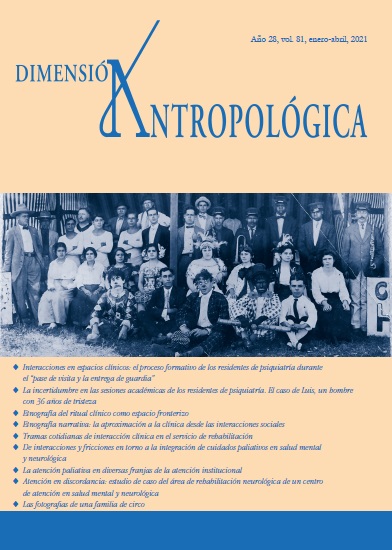Artículos
Publicado 2021-04-30
Palabras clave
- Relaciones interprofesionales,
- rehabilitación neurológica,
- reafirmación jerárquica de saber
Cómo citar
Atención en discordancia: estudio de caso del área de rehabilitación neurológica de un centro de atención en salud mental y neurológica. (2021). Dimensión Antropológica, 81, 173-189. https://revistas.inah.gob.mx/index.php/dimension/article/view/17954
Resumen
El presente trabajo tiene por objetivo describir y analizar las relaciones interprofesionales que se manifiestan durante el proceso de atención en un Centro de Investigación, Formación y Atención Neurológica y Psiquiátrica. El área elegida para realizar el estudio fue el servicio de rehabilitación neurológica, ya que al ser un espacio que se divide en tres ámbitos terapéuticos, nos permitió observar y registrar, durante el proceso de atención médica, un trabajo colaborativo de tres meses, producto de la reafirmación jerárquica de saberes y el conflicto de roles.
Descargas
Los datos de descarga todavía no están disponibles.
Referencias
- Adame, Alexandra y Roger Knudson, “Beyond the Counter-narrative: Exploring Alternative Narratives of Recovery from the Psychiatric Survivor Movement”, Narrative Inquiry, vol. 17, núm. 2, 2007, pp. 157-178.
- Apesoa-Varano, Ester Carolina y Charles S. Varano, Conflicted Health Care: Professionalism and Caring in an Urban Hospital, Nashville, Vanderbilt University Press, 2014.
- Burawoy, Michael, “The Extended Case Method”, Sociological Theory, vol. 16, núm. 1, 1998, University of Berkeley.
- Carr, David, “Narrative and the Real World: An Argument of Continuity”, History and Theory, vol. 25, núm. 2, 1986, pp. 117-131.
- Chase, Susan E., “Taking the Narrative Seriusly: Consequenses for Method and Theory”, en Ruthellen Josselson y Amia Lieblich (eds.), Interpreting Experience: The Narrative Study of Lives, Thousand Oaks, Sage Publications, 1995.
- Gluckman, Max, Analysis of a Social Situation in Modern Zululand, Manchester, Manchester University Press in Rhodes-Livingstone Institute, 1958.
- ____________, Costumbre y conflicto en África, Lima, Asociación Civil Universidad de Ciencias y Humanidades, 2009.
- Good, J. Byron, Medicina, racionalidad y experiencia: una perspectiva antropológica, Ediciones Bellaterra, 2003.
- Hamui Sutton, Liz et al., “Introducción. Experiencia intersubjetividad y sentido: las narrativas en las ciencias sociales y de la salud”, Liz Hamui Sutton et al., Narrativas del padecer. Aproximaciones teórico-metodológicas, El Manual Moderno / Facultad de Medicina, UNAM, 2019.
- Hardcastle, Mark, David Kennard, Sheila Grandison y Leonard Fagin (eds.), Experiences of Mental Health In-patient Care: Narratives from Service Users, Londres, Routledge, 2007.
- Kleiman, Arthur, Patients and Healers in the Context of Culture: An Exploration of the Borderland between Anthropology, Medicine, and Psychiatry, Berkeley, University of California Press, 1980.
- ____________, The Illness Narratives: Suffering, Healing, and the Human Condition, Nueva York, Basic Books, 1988.
- Mateos Blanco, Tania y Luis Núñez Cubero, “Narrativa y educación: indagar la experiencia escolar a través de los relatos”, Teoría de la Educación, vol. 23, núm. 2, 2011, pp. 111-112.
- Mattingly, Cheryl, “The Concept of Therapeutic Emplotment”, Social Science & Medicine, vol. 38, núm. 6, 1994, pp. 811-822.
- Tavory, I. y S. Timmermans, “Two Cases of Ethnography: Grounded Theory and the Extended Case Method”, Ethnography, vol. 10, núm. 3, 2009, pp. 243-263.
- Van Velsen, Jaap, “The Extended-Case Method and Situational Analysis”, en A.L. Epstein (ed.), The Craft of Social Anthropology, Londres y Nueva York, Tavistock Publications, 1967, pp. 129-153.

